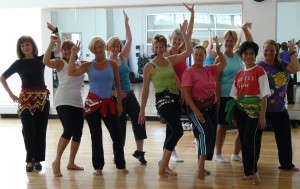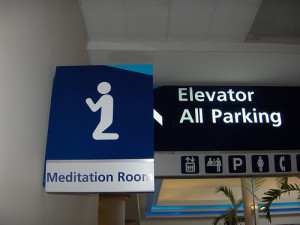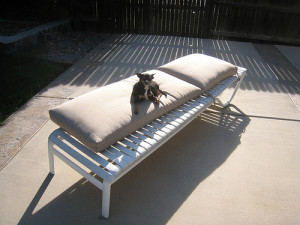by Michelle Sutton-Kerchner
Summer is quickly passing. If you’re still trying to relax and enjoy, get (un)busy with these tips. No more road blocks to stress-free success …
If you feel stressed out while the world around you unwinds in the sun, take action during this season of “lazy days.” You can manage a few such days of your own, and a stress-free attitude for the rest of the calendar.
Exercise to Reduce Stress
Make each workout an opportunity to de-stress. By nature, exercise helps relieve tension. Physically, it decreases stress hormones, like cortisol, and increases feel-good hormones. It provides positive physical exhaustion, which alleviates frustrations and allows a calm to settle over the body. Mentally, it distracts from stressors themselves. Practicing mindfulness during your fitness routine enhances this benefit. Putting your mind fully in the movement and environment is a break from troubles and worry.
An exciting, fresh workout is most effective at accomplishing fitness goals. It is also best for stress reduction. New moves and unfamiliar equipment help by requiring more focus on the tasks at hand (and foot). If you are not ready to update or advance your routine, simply reorganize your current program. This challenges the brain and prevents muscle monotony.
Even small steps out of your comfort zone trigger curiosity in the brain, and a passion for learning. Keep your mind guessing. Cultivating an inquisitive nature helps problem-solve and develops creative thinking. All necessary for stress reduction. It also keeps the brain young, regardless of biological age. Nurture your brain to keep away dementia and other declines often unnecessarily attributed to aging.

The physical and mental ways exercise helps reduce stress have a powerful affect on how we see ourselves. A person who is fit may enjoy increased confidence and strength (on the Exercise Floor and beyond). Combined with a healthy dose of exercise-induced endorphins (happy hormones), it is easier to feel positive and in control. You look and feel healthier, which is the most fashionable way to be powerful.
All forms of exercise combat stress, but some are more effective than others. If you crave a workout that brings on that laidback summer attitude (you know, the one your neighbor on a lounge chair seems to have accomplished effortlessly), try these:
Swim: Enjoy the instant relief of not having to support your physical structure. Allow the water’s buoyancy to carry you. Then, put its resistance to work for you as you accomplish a cardio and strengthening workout. Take these exercises with you when not at the Center. Water workouts help you cool off, from both high temps and high stress levels.

Shake It Off: Take a Group Fitness class and, literally, shake off tensions when you bust a move. Classes also offer a supportive, friendly environment. Exercise feels less like work and more like fun. Being surrounded by others in this endorphin-filled environment can bring a smile after the toughest day. A connection with a workout buddy can keep that smile going, even when not at the Center.
Walk: Take a walk and let your thoughts wander. Sometimes, when you do not focus on issues, solutions come more easily. Or, you may wish to contemplate a specific situation and determine options. Walking also provides an escape. You are physically leaving behind your desk with its piles of work, your kitchen with its messes, or your significant other with a stalled disagreement. Fall into a walking rhythm and succumb to a meditative state.
Practice Yoga, Pilates, T’ai Chi: These forms of exercise take specific steps to incorporate the mind into your workout. In other words, mindfulness is not an option. If you struggle to be in the present, either during your workout or in everyday life, these exercise disciplines strengthen that ability. Mind-body connection is a requirement. Increased mental and physical balance are the outcome. Learn methods of breathing and thinking to help make mindful awareness more possible in all movement.
Incorporate Stress-Reducers
No one is going to hand you an empty day and encourage you to fill it with rest and joy. Free time is hard to find. The solution: Insert a little relaxation into everything you do. This helps make the stressful stuff feel more like a challenge to be overcome than a detriment. It also helps free time feel even better.
Meditate: If you cannot go to the mountains/ocean/insert your peaceful scene here –bring it with you. Take a little piece of peace wherever you travel, even if only to the bank, grocery store, and Center.
Meditation often has a formal and mysterious connotation. Sitting on the hard floor, in an uncomfortable position, trying to think of– nothing?. Banish the idea and the sore tush. It’s time to incorporate meditation into daily life.

If you aren’t finding time for the joys of summer, you surely don’t have time to spend chanting and potentially inducing leg cramps. Save the serious meditation for advanced practitioners. For now, you need to get into relaxation mode, even if you are driving your tenth carpool of the day.
Start with your breath. A lot can be determined, and accomplished, through breathing. (Not just staying alive.) Regardless of what your day holds, take note throughout of how you are breathing. You will forget, so set an alarm somewhere in that electronic world of yours. Start by noting your breathing at the top of every hour. No excuses. It only takes 60 seconds.
Is your breathing shallow? Rapid? Are you holding your breath and feeding your lungs only what it needs to survive? Don’t reprimand yourself, just take note. Then, indulge in a deep breath. Inhale through your nose and exhale through your mouth. Hold the breath for five seconds, or not. It’s your moment. The goal is to note your breathing, not further add to your to-do list.
This simple check-in during your day helps take you out of the chaos, even briefly. You get in touch with how stress is affecting your body, which provides perspective and valuable feedback. As you gain more practice, noting your breath will be easier. Following up with several deep, cleansing breaths can be incorporated into this exercise.
A redirection of attention and energy provides a respite from your day. A chance to dip your feet by the pool, so to speak, without leaving your current surroundings. Eventually, you feel at ease wherever you are because you brought that little piece of peace with you. You will have quieted the internal narrator who chats incessantly about tasks to be done, mistakes made, and other stressful rumination. You will have thought about our most basic function and privilege: breathing.
This type of meditation travels with you everywhere, from the boardroom to the backyard and at all the traffic lights in between. It’s a tool for a more peaceful life.
Sleep: Get your target amount of Zzzs and feel refreshed. Operate at a deficit and exacerbate everyday stressors. Between seven and nine hours of sleep nightly are recommended. Determine your best amount and make it happen.
You can take the most luxurious vacation, schedule an amazing massage, or plan a tranquil day of fishing. Yet, without healthy sleep, the outcome is greatly diminished. Sleep is closely linked to mental and physical health. Consider it a daily vacation for your mind and body to repair itself from the day’s events.

Lack of proper sleep weakens the immune system, which can trigger everything from the common cold to serious chronic health problems. These illness in themselves lead to more stress. A vicious cycle ensues. Poor sleep habits also affect the ability to function properly. Production lacks and cognitive powers weaken.
A full-body workout helps assure quality sleep. If stress levels are high, incorporate some of the aforementioned exercises to burn stress as well as calories. Mindful breathing/meditation is also helpful in creating a healthy state for sleep. If you still struggle with obtaining consistent high-quality sleep, you may want to see a sleep therapist or undergo a sleep study. Most likely though, you are a victim of modern life– too much screen time and stress. Shut it off and slow it down.
Eat well: A poor diet leaves one vulnerable to stress. Focus on mood-supporting foods, including fish high in omega-3s, fruit, and veggies. Avoid ingredients that stress the body, like caffeine, alcohol, and sugar.
A study of 200 people, performed in England, followed this diet by replacing mood-stressors with supporters. Eighty-eight percent of the participants reported improved mental health. This diet resulted in a reduction of mood swings, panic attacks, anxiety, and depression. Combined with an enjoyable workout, you’ve created a serving of endorphin rush.
Eat to maintain stable blood sugar levels throughout the day. This helps avoid stress-related food binges, mood fluctuations, and energy dips– all which are stressors. Low-glycemic carbohydrates consistently fuel the brain. These include whole grain breads and crackers, beans, soy products, apples, peaches, and pears. Protein is also a helpful choice.
Plan ahead to avoid adding more stress to “rush hour.” Fighting traffic is bad enough. Returning home to an empty kitchen exacerbates stress. Often, it requires a trip to the grocery store, along with a crowd of other last-minute meal-makers. Or, you rely on unhealthy take-out or processed foods.

Plan meals in advance. It saves money, calories, and frustration. Use a slow cooker once a week. Arrive to a homemade meal, ready when you are. Now, that’s a little spoon of summer. Use fresh produce and toast the season!
Sail Away (or at least Saunter to Your Backyard)
Bring out the lounge chair! You may not be reclining on it as much as you’d like. But, with these relaxation tips, your mind will think more like a sunbather–without the hassle of sunscreen and the expense of airfare.
Sources
“Food to Balance Your Mood,” by Star Lawrence at www.webmd.com.
“What Types of Stress Reduction Exercise Are Most Effective?” by Elizabeth Scott at www.about.com.
Image Credits
Summer picnic at a distance (introductory photo): www.flickr.com/photos/ellenm1/9063573072/
Swimmer: www.flickr.com/photos/thebmxgirl/7736249514/
Meditation room: www.flickr.com/photos/joeshlabotnik/1198523560/
Sleep: www.flickr.com/photos/planetchopstick/497736998/
Lounge chair: www.flickr.com/photos/cogdog/2819740379/
 Fitness & Wellness News Your Source for Fitness News, Wellness News, Health News, and Nutrition News!
Fitness & Wellness News Your Source for Fitness News, Wellness News, Health News, and Nutrition News!




